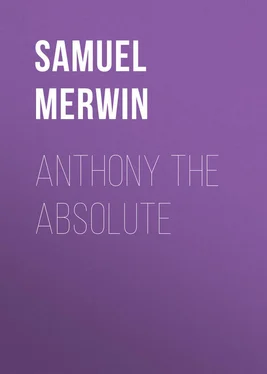Samuel Merwin - Anthony The Absolute
Здесь есть возможность читать онлайн «Samuel Merwin - Anthony The Absolute» — ознакомительный отрывок электронной книги совершенно бесплатно, а после прочтения отрывка купить полную версию. В некоторых случаях можно слушать аудио, скачать через торрент в формате fb2 и присутствует краткое содержание. ISBN: , Жанр: foreign_prose, на английском языке. Описание произведения, (предисловие) а так же отзывы посетителей доступны на портале библиотеки ЛибКат.
- Название:Anthony The Absolute
- Автор:
- Жанр:
- Год:неизвестен
- ISBN:http://www.gutenberg.org/ebooks/52507
- Рейтинг книги:5 / 5. Голосов: 1
-
Избранное:Добавить в избранное
- Отзывы:
-
Ваша оценка:
- 100
- 1
- 2
- 3
- 4
- 5
Anthony The Absolute: краткое содержание, описание и аннотация
Предлагаем к чтению аннотацию, описание, краткое содержание или предисловие (зависит от того, что написал сам автор книги «Anthony The Absolute»). Если вы не нашли необходимую информацию о книге — напишите в комментариях, мы постараемся отыскать её.
Anthony The Absolute — читать онлайн ознакомительный отрывок
Ниже представлен текст книги, разбитый по страницам. Система сохранения места последней прочитанной страницы, позволяет с удобством читать онлайн бесплатно книгу «Anthony The Absolute», без необходимости каждый раз заново искать на чём Вы остановились. Поставьте закладку, и сможете в любой момент перейти на страницу, на которой закончили чтение.
Интервал:
Закладка:
Yes, in this odd atmosphere I live and, in a manner, breathe – I and the slim, beautifully dressed woman who walks so firmly on the balls of her feet. Whoever she may be, she belongs here no more than I.
Of course, the chances are all against – yet I wonder! For one thing, she is alone. I am positive of this. All the other guests I have seen, now, coming and going. But she never comes or goes – excepting apparently for a short walk each afternoon, and always unaccompanied. He would not have deserted her – away out here. Surely a man would not do that to a woman he has loved.
But wait – I am forgetting the sort of world this is. There is nothing – nothing – man does not do to woman. Or that woman does not do to man. Nothing is too subtly selfish, nothing too cruel.
To-day I mean to time my own walk with hers. I must see her in the light. I must observe her throat and her face… At the thought of what I may see my nerves behave abominably. My forehead burns. My heart beats with an absurd irregularity. These facts alone appear to indicate that my place is not in this wild world of passion and conflict.
It is not wholly unpleasant here in my dingy little room – though the carpet is a rag, and the door between me and my next neighbor has shrunk its lock out of alignment and appears to be blocked off, on the farther side, by some bulky piece of furniture. This door opens on my side of the partition.
No, it is not so unpleasant. Outside, the sun is shining. To my nostrils comes floating the quaint, pungent odor that has in the minds of so many travelers characterized the East. Over the low-tiled roofs of a row of Chinese houses I can see – beyond an open space – the masonry wall of the fortified Legation Quarter, with a sentry-box peeping above it, and the flag of Italy, and trees.
April 5th – night
IT is she.
This afternoon I was revising my notation of the Japanese music; quite late, five o’clock or so. Suddenly I heard a voice – a woman’s voice – singing very softly, in the next room, beyond that shrunken door and the bulky piece of furniture. It is a bureau, I think, with a mirror above it that is nearly as high as the door.
She was singing “ Aus Meinen Grossen Schmerzen ” of Robert Franz, that saddest and most exquisite of German lieder . The voice is a full, even soprano. It is a big voice, I am sure, though she sang so softly. The impression I received was that she was carefully holding it down to a pianissimo . It is, I should say, a remarkable organ. Even in her softest voice there is what the great singers call an “edge” – that firm, fine resonance that will send the lightest thread of tone floating out over all the volume of sound of a full orchestra.
She sang the little song with a tone color of poignant sadness – as if her heart were throbbing with all the sorrow of the world, and yet as if she could not keep from singing. She has plainly studied much. The impulse to sing and the habit of singing are strong within her.
But the voice, so beautiful and under such fine control, was not what suddenly caused me to leap up from my chair and tiptoe to that rather useless door, and then to turn to my kit-bag and fumble wildly for my tuning-fork. No; what excited me – for it did excite me out of all reason – was her sense of pitch. The mezzo-soprano or baritone transposition of that Franz song is in the key of f -major, ending in d -minor. I stood by her door, the c -fork resting lightly against my teeth, waiting for that lovely voice to descend the final minor third, linger, tenderly and sadly, on the d . Then I bit the fork. She was singing a perfect d . Certainly there was no piano in any of these miserable little rooms. And she had employed no other instrument; she had simply and naturally broken into song because she could not help singing. She has absolute pitch!
The great regret of my life is that my own sense of pitch is not absolute. It is very nearly but not quite perfect, despite my extremely delicate ear for close intervals. Yet this young woman, who to my own knowledge has not sung a note for several days, and who can not conceivably have heard any Occidental music whatever, breaks into song, and casually and unconsciously employs the correct pitch to the twentieth part of a tone.
My first thought was that it might be an accident. So I waited, tuning-fork in hand.
Having begun to sing, of course she could not stop. I am thinking now that probably it was the first time she had released her voice for a considerable period, and that at last she simply could not help making use of what was the natural outlet for her emotions.
She next hummed a few bars of “ Im Herbst ,” also by Franz. Evidently she is fond of the work of this fine lyric composer. This is in the key of c -minor. Again I tested her with my tuning-fork, and again she was correct to the minutest shade of a tone. Her voice had leaped the interval between the two keys apparently without a conscious thought on her own part.
This second song perhaps failed as a vehicle for her mood; at any rate, she stopped it abruptly, and was silent for a time. Standing there close to the door, I could hear her moving about with light, restless feet. Myself, I held my breath at moments. Then the sound of her footsteps ceased, and there was a sudden creaking sound, as if she had thrown herself upon the bed. But still I waited, breathless, balancing there with my left hand against the door-frame, the right clutching the tuning-fork. I was sure she would sing again.
She did. But it must have been after quite a. long time, for I realized afterward that my feet ached and that the arm I held up against the door frame had, as we say, gone to sleep.
Finally there came another creaking. She was getting up. Doubtless she was quite too restless to lie down long. Again I heard the quick, light sound of her feet moving about the room. Then the voice again. And again it was that saddest and most exquisite of songs.
”Aus meinen grossen Schmerzen
Mach’ ich die kleine Lieder…”
she sang, very low. I felt nearly certain that she had slipped naturally back into the key of f -major, but not absolutely certain.
It was disturbing, this partial uncertainty on my part. No person in the world – not a single living being – has quite so great a need for absolute pitch as I. With that, coupled with my ear for intervals, I would stand as the one scholar perfectly equipped for my own line of investigation. As it is, I am not unlike an astronomer with enthusiasm, exhaustive knowledge, a fine mathematical brain, and a marvelous seeing eye, but with a very slight – oh, – very slight – touch of color-blindness. And I never before missed this one attribute quite so keenly as I miss it now, out here on the ground for the great first-hand investigation of my whole life.
So at last I had to give up my effort to place precisely the key in which she was singing, and sound the fork. As I supposed, she was right again. There was no doubt now. Not the slightest. As I have already written down, she has it – a sheer, prodigal gift of nature. And, of course, it is of no particular value to her. She is not even, at present, a professional singer; and, if she were, she could do very well without this precise gift… I have supposed for years that I had a philosophy. I long ago realized that to waste time and tissue in concerning myself with the one defect in my equipment would be simply by that much to impair my actual effectiveness. But to-day my philosophy failed me, as I thought of that sad little woman who has what I lack, and who does not need it. I even had a wild notion of knocking on the door and making myself known to her.
Читать дальшеИнтервал:
Закладка:
Похожие книги на «Anthony The Absolute»
Представляем Вашему вниманию похожие книги на «Anthony The Absolute» списком для выбора. Мы отобрали схожую по названию и смыслу литературу в надежде предоставить читателям больше вариантов отыскать новые, интересные, ещё непрочитанные произведения.
Обсуждение, отзывы о книге «Anthony The Absolute» и просто собственные мнения читателей. Оставьте ваши комментарии, напишите, что Вы думаете о произведении, его смысле или главных героях. Укажите что конкретно понравилось, а что нет, и почему Вы так считаете.












